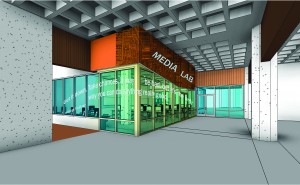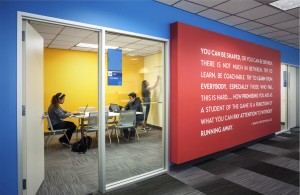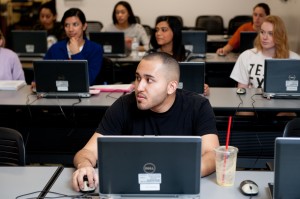
“A real building is one on which the eye can light and stay lit,” exhorted poet Ezra Pound, commenting on the need for architecture to be visually engaging in order to stimulate the mind — a thought that could just as easily apply to that which occurs within a given structure. With the Perry-Castañeda Library’s (PCL) recent entry in the Austin Chronicle’s “Best of 2014” issue with the dubious distinction of “Best Brutalist Architecture,” there’s little promise that the edifice of the 70’s-era building would meet Pound’s condition for generating intellectual inspiration, so the Libraries must instead focus on that which occurs within the walls of its spaces to spark creativity and innovation.
To that end, the Libraries is undertaking its largest transformation of space since the PCL’s construction in an effort to adapt to the changing needs and practices of its users, as well as to the expectations of the larger campus community.
This semester, construction is beginning on phase one of a project to create a cross-campus collaborative space in the Libraries’ flagship branch where student learning at the university will enter a new era. The University of Texas Libraries Learning Commons has been in development over the past 18 months through engagement with campus stakeholders and discussions with university administrators to envision the transformation of outmoded library space into a place where active learning and modern scholarship can occur.
“Libraries have learned from recent paradigm shifts to be more agile than they were traditionally,” says Executive Associate Director Catherine Hamer. “While shrinking budgets compound the difficulty of making wholesale changes to how we operate, we’ve continued planning and executing on efforts that are known needs for students, faculty and researchers. We’ve been developing the Learning Commons as a major strategic goal behind the scenes for some time, and I’m gratified that we’re finally able to announce it as a reality.”

The 20,000 square-foot renovation on the entry-level of PCL will include new technology-rich classrooms built for 21st century learning, consultation spaces and meeting areas. It will boast a modern media lab with high-end software and support for digital media creation that will be available to every student on campus — regardless of college or school — as well as support for faculty who want to incorporate digital literacy into their courses. The Learning Commons will also serve as the new home for the University Writing Center (UWC), the first-of-its-kind partnership between the Libraries and another campus service unit devised to streamline resources for students at UT by locating specialized service at the point of need.
The vision of the Learning Commons is to create a one-stop-shop for student research and productivity, making various opportunities for intellectual growth possible in a single place. A range of services will be available in the transformed space, including the continuation of current offerings like instruction and research consultations, and the addition of new options like writing assistance from trained UWC staff and assistance with digital media projects with trained staff using enhanced media lab hardware and software. The Libraries also hope to introduce additional services as part of future expansion of the Learning Commons, including oral communication consultations for presentations, drop-in tutoring sessions with staff from the Sanger Learning Center and help with statistical analysis using specialized software available in the Learning Commons.
Beyond the physical changes, a major component of the transformation will focus on the types of activities taking place in the space. The Libraries will work with campus partners to develop a rich array of programming including workshops on research, writing, public speaking, career exploration, digital media tools and more aimed at both undergraduate and graduate audiences, with a focus on highlighting faculty and student research from across the Forty Acres.
Michele Ostrow, head of Libraries’ Teaching and Learning Services and a driving force behind the project, sees great promise in joining efforts with other members of the campus community. “The Learning Commons is about space but it is also about the mission to deepen academic support for all students regardless of college or school,” says Ostrow. “We have already started new collaborations between academic support units on campus and will expand our partnerships so that students will be seamlessly supported through every phase of their academic work, from exploration through creation.”

The overall cost for the first phase of the project — roughly $4.5 million — has been shouldered with the help of the Office of the Provost ($2 million), the College of Liberal Arts ($500,000), and the Libraries ($1.5 million). The Libraries will still need to raise roughly $500,000 in order to fund the technology needs — one of, if not the most critical of components — for the Learning Commons. Additional phases of the project would further develop spaces with even greater learning potential and more robust technology, and the possible incorporation of creative or maker spaces that are becoming the norm in modern libraries.
Architectural design firm Gensler was retained last summer, and has since worked with staff and campus partners to build plans for the Learning Commons that meet the guidelines of budget considerations and varying interests. Gensler has spent several years gathering and distilling data on modern academic library usage patterns, and has worked previously on projects at NYU, MIT and UC-Berkeley.
Construction of the Learning Commons is projected for completion by August 2015.
To support the creation of the Learning Commons, contact Gregory Perrin at perring@austin.utexas.edu or 512-495-4349, or visit the Libraries online giving page to make a donation.
